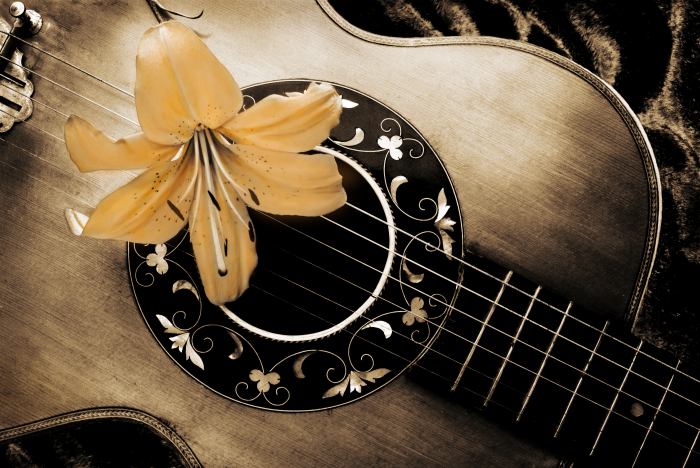
Troubadours of ladies ‘ hearts
Guitar history
Do you know that the most adored and beloved musical instrument-a guitar, without which no significant meeting of friends, quite an ancient instrument. And behold, imagine, never would have thought, that our favorite guitar by age older than even the Egyptian pyramids! Don’t you believe it? Do you want proof?
You are welcome! Scientists-Egyptologists, coming to Cairo from almost all over the world, for centuries devote themselves to the science of studying the mysteries of the Egyptian pyramids. Once over the tombs of the pharaohs they found the bas-relief of festive scenes. One of them shows a musician in whose hands they have identified a guitar, which has a quite modern form-in the form of a graceful figure of eight. It was a sensation, which in science does not happen often. A loud scientific thunder sounded. A real discovery! By the way, scientific-historical disputes have been going on for the pyramids. And we are almost convinced that neither the Egyptians, nor their numerous slaves, physically could not at that technology erect such unique constructions. And this means that the creators of these grandiose buildings were either Atlanta, as we repeatedly declare the scientific brotherhood, based on modern research, or representatives of extraterrestrial civilization. It is difficult for them to argue in this statement. Scientists, having demonstrated the evidence base, convinced us of their views. It is almost impossible to deny them.
Agree, it is difficult to exclude the fact that Atlanta and the representatives of extraterrestrial civilization, as well as we-do not rule out that they were not less loved US music. And in this case, plunging into the depth of available knowledge, there are a lot of questions about the true origin of the guitar. It is almost impossible to exclude its extraterrestrial origin, but to prove this fact-I still do not undertake. It’s too troublesome.
Now it’s time to find out where the word “guitar” came from. It was formed from the merger of Persian “tar”-“string” and Sanskrit “Sangita”-“music”. And supposed at the very beginning of the Chetyrehstrunnyj tool. Getting the spread and recognition of it from Asia and Africa in Europe the word “guitar” changed many times. It was only in the eighteenth century that it was definitively adopted in its name.
Although… there is an irrefutable historical fact-the age of the guitar exceeds five millennia. She was listened to and admireded by our distant ancestors three thousand years before the birth of Jesus Christ. And we-contemporaries are also no exception. Is it possible to forget the magical charming guitar solo at the Campfire! These touching sounds accompany tourists and geologists in distant hikes. Not only that, they warm their soul and add strength to overcome difficult obstacles. And our Barda, writing poems and melodies specially for six and semistrunnyh guitars… In these songs not only a love theme, reflecting our feelings for the woman, but also the sons love to the native land…
Can you imagine a gypsy camp without a guitar? After all, Gypsies without a horse and a guitar-not gypsies… And how many times in historical films we have heard and admired serenades Spanish and Italian troubadours praise their loved ones and devoting their best songs and ballads. They are still being performed on the world’s best scenes. So, in fact, the guitar is a part of a huge layer of not only European culture, but the whole world. And in its creation for many centuries have taken the most active participation of musicians not only of Europe, but also of the Arab countries and even China.
But the most impressive contribution, to our joy, in the final shape of the guitar in the sixteenth century and up to the eighteenth, was made by the Italians. It was they who finally gave shape to the instrument in the form of figures eight or, as expressed today, the contour of the graceful female body. Surprisingly, the last touches in the creation of the modern appearance of the guitar was made by the famous master of musical violin Nicolo Amati. Even today we awed these forms. Maybe because we used to mind the guitar from early childhood.
And also about the contribution of the Italians in popularization of guitar playing. The first violin of the World Niccolo Paganini adored the guitar and devoted to it more than 200 works. For the first time the guitar sounds were used in the musical accompaniment of their operas by composers Verdi, Rossini, Monteverdi… The composers Weber, Berlioz, Gounod… And Russian composers Glinka and Tchaikovsky selflessly were in love with music. They could listen to the captivating melody performed by virtuoso guitarists for hours.
The most enthusiastic pages in their works devoted guitar poets and writers: Goethe, Kerner, Byron, Derzhavin, Pushkin and Lermontov, and many modern writers, and poets devote the best guitar strings…
Do you remember that for many years there was invisible competition between lute and guitar? Practically, these are two related instruments. In the beginning, up to the middle of the eighteenth century, lute supported Europe, except Italy and Spain. And only in the second half of the century the guitar conquered Vienna with the superiority of the musical band and Timbre. Then the whole of Europe recognized the primacy of the guitar. And, nevertheless, the hobby of playing the guitar can be described wavy phenomenon. Interest in it that grew, then waning. It’s like a tide.
Thanks to Italy and Spain, and their unparalleled trubaduram, the love for the guitar was constant and interest in it only grew. Especially in Spain. It is here that since the sixteenth century, a special school of guitar playing has been created. Dozens of unsurpassed Masters raised this school. Thanks to them the Spanish guitar today sounds especially beautiful and emotionally. Hundreds of millions of discs with their concerts diverge like hot pies.
In the last two centuries the guitar has undergone a lot of changes in different countries of the world. Received various names and applications. But wherever it sounded: on the big stage or in the circle of close friends, its sounds are always welcome and warm US soul.
Written by Eugen Schlee
Translated with bing.com





